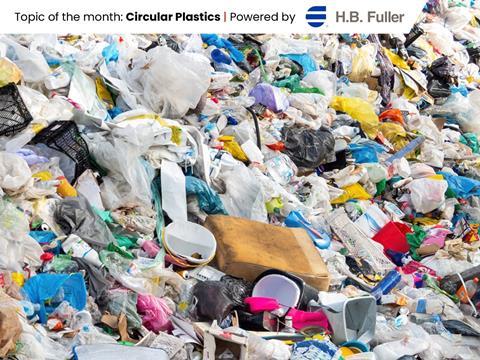
In its new Solution Model playbook, the Alliance to End Plastic Waste outlines its approach to converting mixed plastic waste into products of value – keeping investment and technology requirements minimal to ensure its accessibility for countries with less developed recycling systems.
The first two playbooks – Engaging Households in Segregated Municipal Waste Collection and Unlocking Value Through Basic Manual Sorting of Municipal Waste – were developed alongside Boston Consulting Group and released in March 2024.
Now the third instalment, Capturing Value Through Basic Mechanical Recycling of Mixed Plastic Waste, outlines the ways in which mechanical recycling can utilize ‘simple’ technologies to convert waste into furniture and basic construction materials.
Mixed plastic waste streams are reportedly difficult to recycle economically, so the playbook examines what the Alliance considers to be easily scalable, low-technology methods for converting mixed-waste streams into usable products and keeping recovered plastic in circulation. It prioritizes collection, processing and converting as key components of the value chain, ensuring that recycling feedstock is supplied consistently.
Apparently, turning waste into products with market value keeps plastic waste out of oceans and landfill, cuts down on plastic pollution rates, and establishes a circular, closed-loop system. The process is thought to create jobs and stimulate local economies without requiring excessive initial investment, keeping it accessible to small businesses and low-income regions.
The Alliance explains that its model is informed by projects implemented in Costa Rica, Ghana, South Africa, the USA, the Philippines, and other regions. Challenges, lessons, and enabling conditions for success are all recorded in the playbook.
Its findings are predominantly aimed at countries in the early stages of waste management maturity, namely those classified in Categories I, II, and III under the Plastic Waste Management Framework.
Such categories encompass nations operating under limited or no management regulation and infrastructure; and those dependent on waste reclaimers in an informal sector and recycling systems with smaller entrepreneurs at the helm, taking advantage of ‘niche market opportunities’.
Nevertheless, countries with more advanced waste management and recycling systems can also utilize these solutions.
“Tackling plastic pollution requires a multifaceted, multistakeholder approach,” said Alliance president and CEO Jacob Duer. “Solution Model playbooks are aimed at improving the understanding of the many stakeholders across the plastic value chain about what is possible and what else is needed to drive systems change to end plastic waste in the environment and develop a circular economy for plastics.
“Our hope is that the playbooks will encourage other organizations to scale and replicate these solutions, as we seek a wide range of partners to accelerate the achievement of a circular economy that transforms plastic into a sustainable material.”
Arun Rajamani, managing director and partner at Boston Consulting Group, added: “Speed, efficiency, and scalability are critical to addressing the challenges of plastic waste management, especially in the face of rising global plastic consumption.
“At BCG, we are committed to advancing sustainability and circularity, which is why in close collaboration with the Alliance, we applied our expertise to help design, document, and disseminate these Solution Models.
“We hope these playbooks, enriched with practical insights, lessons learned, and real-world examples, will empower stakeholders to strengthen recycling systems and accelerate progress toward a circular economy.”
In similar news, Packaging Europe has published its own guide to tackling the 335+ million tonne increase in Africa’s plastic waste throughout the last fifty years, consulting the expertise of the African Circular Economy Alliance, Circularium Africa Advisory’s Clem Ugorji, the Aga Khan Fund for Economic Development, and more.
Two guides were also created last year to help develop and achieve food safety guidelines for the Mongolian food sector, stemming from a project completed by the World Packaging Organisation and the United Nations Industrial Development Organization. The guides were modelled on international best practices and the Food and Agriculture Organization’s Codex/CAC/RCP 1-1969 food hygiene principles.
Members of the Alliance to End Plastic Waste were caught up in controversy late last year as Unearthed, an independent journalism team at Greenpeace UK, accused them of producing over 1,000 times more plastic than they cleaned up in its first five years and engaging in ‘greenwashing’. The Alliance argued that there was ‘no factual basis’ for these claims.
If you liked this story, you might also enjoy:
The ultimate guide to the Packaging and Packaging Waste Regulation in 2024
How are the top brands progressing on packaging sustainability?
Sustainable Innovation Report 2024: Current trends and future priorities
Everything you need to know about global plastic sustainability regulation













No comments yet